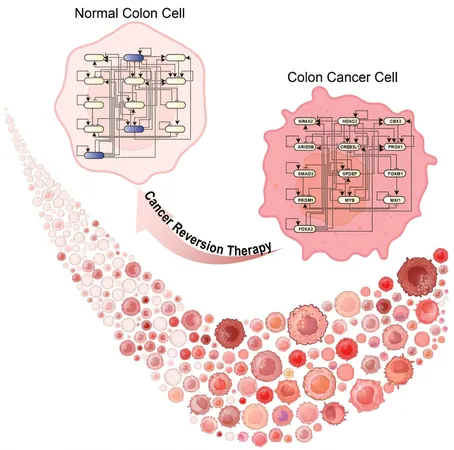
Revolutionary Breakthrough: Scientists Discover Method to Revert Colon Cancer Cells to Normal State!
2024-12-23
Author: Rajesh
Groundbreaking Technology in Cancer Research
In an incredible leap forward in cancer research, a dedicated team led by Professor Kwang-Hyun Cho from KAIST's Department of Bio and Brain Engineering has unveiled a groundbreaking technology that challenges the long-standing paradigm of cancer treatment. While traditional therapies focus on outright destroying cancer cells, their approach seeks to transform these malignant cells into a state reminiscent of normal colon cells, eliminating the harsh side effects associated with conventional treatments.
New Insights into Cancer Biology
Published in the prestigious journal Advanced Science, the study highlights a pivotal moment in our understanding of cancer biology. The researchers observed that during the early stages of cancer formation, or oncogenesis, normal cells can regress along their differentiation path. This insight inspired them to create a sophisticated model—a digital twin—replicating the gene networks involved in the natural differentiation of healthy cells.
Transforming Cancer Cells
Through advanced simulation techniques, the team meticulously pinpointed key molecular switches that can prompt the transformation of colon cancer cells. The application of these switches revealed astonishing results; cancer cells began reverting to their normal-like state, a phenomenon confirmed through extensive molecular, cellular experiments, and rigorous animal studies.
A New Paradigm in Cancer Treatment
This remarkable discovery not only illustrates the potential for systematic reversion of cancer cells but also opens doors to a new category of cancer treatment—reversible cancer therapies. “The ability to convert cancer cells back to a normal state is an extraordinary phenomenon,” expressed Professor Cho. “Our findings emphasize that such transformation can be induced methodically.”
Implications for Future Cancer Therapies
With the introduction of this pioneering technology, the research lays crucial groundwork for future cancer therapies that could be applied across various cancer types. Imagine a world where cancer treatment does not mean battling side effects but instead focuses on restoring normalcy to affected cells!
The Future of Oncology
As the research community buzzes with excitement over this discovery, many are left to wonder: Could this be the next revolution in oncology? Stay tuned as we dive deeper into the implications of this transformative breakthrough in the fight against cancer!



 Brasil (PT)
Brasil (PT)
 Canada (EN)
Canada (EN)
 Chile (ES)
Chile (ES)
 España (ES)
España (ES)
 France (FR)
France (FR)
 Hong Kong (EN)
Hong Kong (EN)
 Italia (IT)
Italia (IT)
 日本 (JA)
日本 (JA)
 Magyarország (HU)
Magyarország (HU)
 Norge (NO)
Norge (NO)
 Polska (PL)
Polska (PL)
 Schweiz (DE)
Schweiz (DE)
 Singapore (EN)
Singapore (EN)
 Sverige (SV)
Sverige (SV)
 Suomi (FI)
Suomi (FI)
 Türkiye (TR)
Türkiye (TR)